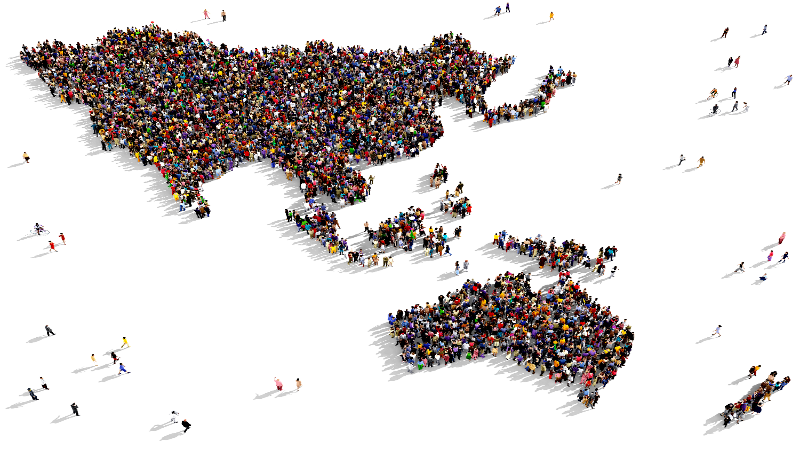Australia-China monthly wrap-up: December 2020
January 14 2021

By Elena Collinson and James Laurenceson
The year closed with relations between Australia and the People’s Republic of China (PRC) in distinctly worse shape, and with scant prospect for improvement in the near future. There is little political inclination on either side to shift present stances, meaning relations in 2021 will, at best, continue at an impasse, if not continue to deteriorate.
In December the PRC continued to place economic pressure on Australia’s agricultural sector by suspending further imports of timber logs from Tasmania and South Australia, blocking imports from two more Australian abattoirs and extending trade bans on two Australian lamb exporters. Australia on December 16 referred the PRC to the World Trade Organization over its imposition of 80 percent tariffs on barley. A process that can take years to see through, the move is likely more symbolic than anything else.
Outgoing Trade Minister Simon Birmingham on December 10, following a near year-long attempt to treat diplomatically with the PRC’s actions in public, bluntly acknowledged the issues within the Australia-PRC economic relationship: ‘The pattern of disruption to a range of Australian export industries right throughout the course of this year does demonstrate that there is a real problem’. And on December 21, his last day as Trade Minister, he described in an opinion piece the PRC’s ‘punitive trade actions against Australian businesses’ as ‘unfair, unjust and unwarranted’.
There are also some concerns that Australian iron ore might be next targeted, although according to some analysts this is unlikely given ‘China has an import dependency of 70 percent, and given they have so little of their own domestic iron ore resources, it's not going to take too long until this dependency on imports increases even more.’
While reasoning this month from an anonymous Australian national security official that Beijing was punishing Australia because ‘they hate us’ is perhaps overly simplistic analysis, there is certainly a dearth of goodwill towards Australia in Beijing. While Canberra has generally sought to modulate its rhetoric with respect to the PRC this past year – for example with Prime Minister Scott Morrison during a December 17 press conference saying, ‘The relationship between Australia and China is a mutually beneficial relationship and the current tensions are of no value to China or Australia. It is not assisting either of us and so that's why it is important that we work through these issues and we're very happy to do so’ – its policy substance indicates that a reset with the PRC is not front of mind. The Prime Minister’s promotion of Liberal backbencher Andrew Hastie, a strong critic of the PRC, to Assistant Minister for Defence, announced during a cabinet reshuffle on December 18, is perhaps a notable indicator of the current mood in government, as is Treasurer Josh Frydenberg’s remark on December 3 that compromise was not on the table with respect to Australian government stances that the PRC had taken issue with. He said of then-upcoming legislation which would allow the federal government review and terminate agreements between foreign governments and Australian states, local councils and universities (discussed in greater detail below): ‘I don’t accept the premise that if you compromised on that it would suddenly lead to a change in what is a challenging time in the relationship’.
Both Australia and the PRC continue to refer to their Comprehensive Strategic Partnership and its import, but this appears to have become a rather empty phrase. Australia is unlikely to cede any ground as to do so will be perceived as weakness, and the PRC is equally unlikely to do the same given the desire to set a strong precedent – showing other countries how it will likely react should they elect to pursue the Australian course of resistance.
The Opposition Labor Party, generally supportive of government policy and stances on the PRC – expressing, for example, unity with the government in condemning a Twitter missive slurring the Australian Defence Force from a lower ranking PRC Foreign Ministry official[1] – has increased its calls for the government to develop and articulate a coherent strategy on dealing with Australia’s deteriorating relationship with the PRC. This was a talking point Opposition Leader Anthony Albanese and Shadow Foreign Minister Penny Wong wove into most of their press conferences touching on the PRC this month. While the Opposition ‘stand with the Government on Australian values’, they have demanded the government ‘explain what their strategy is going forward’, pointing in a critical fashion to the ‘increased concentration on the trading relationship with China’ led by the government. The Opposition Leader said that ‘This government seems to have presided over a complete breakdown of relationships’. Asked to elucidate upon what an optimal strategy on the PRC might look like, senior Labor representatives have thus far demurred from answering directly.
Petty political tit-for-tat from the PRC side was in full swing at the beginning of December. Flowing on from the Twitter missive-related diplomatic spat between Australia and the PRC (see November 2020 monthly wrap-up) messaging and social media platform WeChat censored a message published by Prime Minister Morrison addressing the Australian-Chinese community on December 2 claiming it ‘violated’ regulations, including ‘distorting historical events and confusing the public’. Australia had been supported in its condemnation of the tweet in question by the United States, New Zealand, France, Canada and the European Union, although within Australia there had been some questions around whether such a forceful reaction from the Prime Minister directly addressing the tweet was the most effective response.
2020 saw increasing distrust of the PRC amongst Western nations and, in parallel, an appetite to explore ways in which to work in together with Australia to meet the challenge of a belligerent PRC. For example, North Atlantic Treaty Organization (NATO) head Jens Stoltenberg during a Q&A following a speech he delivered on December 2 said, ‘[F]or NATO, it is of increasing importance, also when we address the consequences of the rise of China, to work even more closely with a partner like Australia.’ It was also reported on December 16 that officials from some of the Five Eyes nations had held discussions with Australia on how they might respond as a group to the PRC’s trade restrictions on Australia. However, such collective action – at least for the moment – seems to be consigned to theory.
On December 8 the Australian Parliament passed legislation which will allow the federal government to review and terminate agreements between foreign governments and Australian states, local councils and universities. States and territories will have a three-month window to provide the federal government with details of their foreign agreements for review. While senior government ministers have denied that the new legislation is targeted at the PRC, it is widely expected that arrangements with the PRC will face the most scrutiny. Victoria’s Memorandum of Understanding (MoU) on the Belt and Road Initiative (BRI) is unlikely to pass muster given the government’s criticism of it since its inception. The Treasurer on December 8 in a press conference said of the BRI MoU, ‘We didn’t agree with it in the first place, still don’t agree with it, and no doubt decisions will be made in due course’. And earlier, on December 4, Home Affairs Minister Peter Dutton was emphatic about the government’s opposition to it, stating: ‘The government’s been very clear that we don’t support the agreement that the Victorian government’s entered into. I don’t think it’s in our national interest. It’s against our foreign policy.’ How the new foreign relations legislation is wielded may pave the way for further friction with the PRC.
Also set to potentially contribute to turbulence in 2021 is the recommendation of the Human Rights Sub-committee of the Joint Standing Committee on Foreign Affairs, via a report released on December 7, for the Australian government pass Magnitsky-style laws that allow for the retrospective sanctioning of individuals and associated entities accused of violating human rights. The recommended targeted sanctions included banning entry to Australia, and the capacity to seize assets. A major focus of submissions to the Magnitsky Act inquiry centred on PRC authorities’ actions in Xinjiang and Hong Kong.
Australia in 2021 will also be keeping a close eye on developments in the South China Sea. Defence Department Secretary Greg Moriarty during an Australian National University event on December 8 said, ‘I’m particularly concerned about the militarisation of features in the South China Sea, which continues’. The PRC appears to have sensed an opportunity to accelerate their agenda in the contested waters – and elsewhere – while the world in 2020 was preoccupied with grappling with the COVID-19 pandemic.
The annual total value of goods exports to China rose again in October, hitting $146.7 billion. This is just shy of the $149.2 billion recorded in 2019, a record high for a calendar year. With iron ore prices accelerating sharply since November, there’s a distinct possibility that even as barley, lobster and wine sales trail off as the year draws to a close, 2020 could set a new record in aggregate.
Key trade indicators table - December 2020
Elena Collinson is a senior researcher at the Australia-China Relations Institute, the University of Technology Sydney.
Professor James Laurenceson is Director of the Australia-China Relations Institute at the University of Technology Sydney.
Sources
[1] This development is discussed in Elena Collinson and James Laurenceson, Australia-China monthly wrap-up: November 2020, Australia-China Relations Institute, University of Technology Sydney <https://www.australiachinarelations.org/content/australia-china-monthly-wrap-november-2020> and further discussed below.


